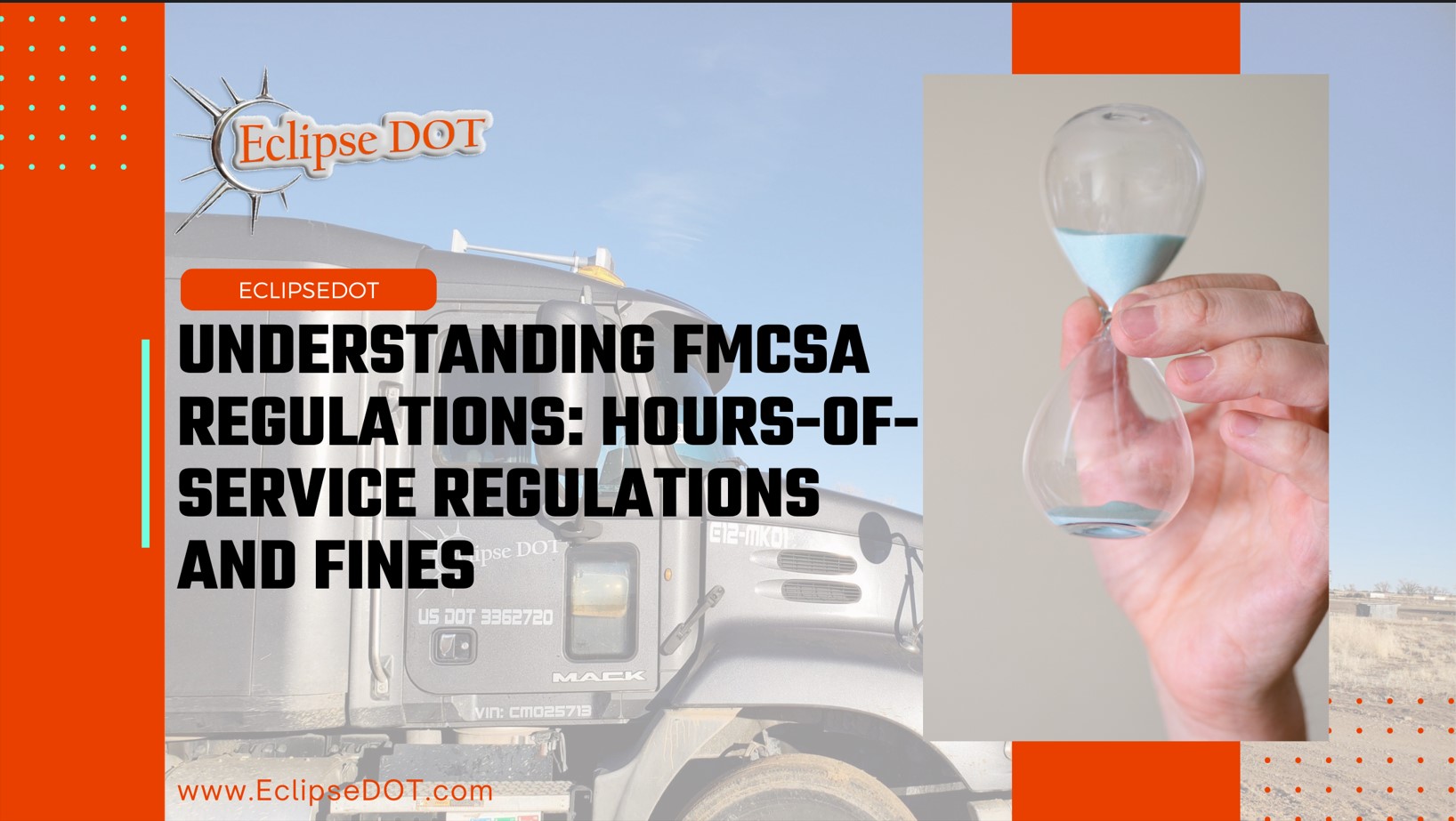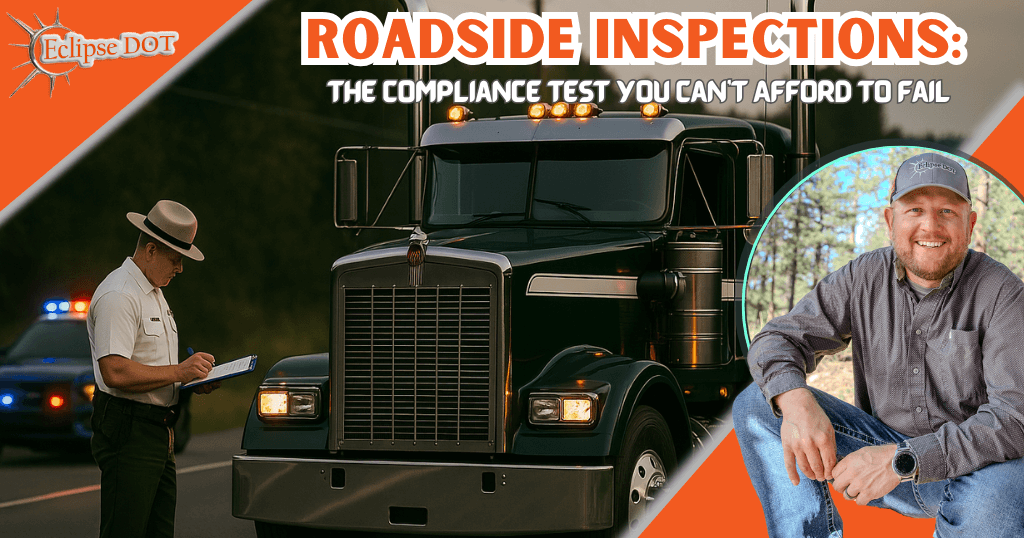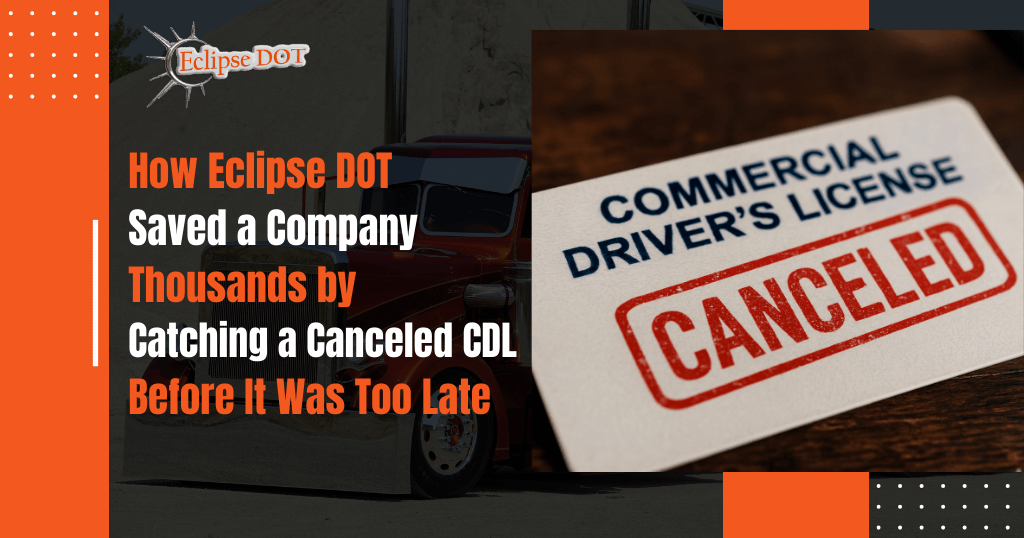Hey everyone, Dan Greer here! Buckle up because we’re about to take a joyride through the world of Federal Motor Carrier Safety Administration (FMCSA) regulations. Trust me, it’s more exciting than it sounds. If you’re here, you’re in the right spot to start understanding the nuances of FMCSA regulations. Today, we’re getting our feet wet with Hours-of-Service (HOS) violations. Let’s hit the road!
I know FMCSA rules can be a bit of a puzzle, whether you’re a DOT pro or just getting started. I was in your shoes decades ago, searching high and low for something to help me out. Spoiler alert: there wasn’t much available.
I had to figure these things out on my own, and it wasn’t easy at first. But hey, I love a good challenge. The last thing I want is to make things harder for you, so I’m here to break it down as simply as possible. Let’s rev up and dive into HOS violations—our first pit stop in a series of FMCSA regulation articles.
What Exactly are HOS Violations?
Imagine this: You’re cruising down the highway, feeling invincible. But wait, are you following the HOS rules? Hours of Service (HOS) violations are breaches of FMCSA regulations about the maximum amount of time commercial motor vehicle (CMV) operators can drive and work within a set period. These rules are designed to prevent driver fatigue, enhance roadway safety, and ensure drivers get enough rest.
After all, do you want a tired driver hauling your cargo and potentially putting your operation and business at risk? Our guess is ABSOLUTELY not.
HOS violations are a big no-no. These violations can lead to penalties for both drivers and their employers. When I was a driver, I made sure to make regular stops to eat and rest before hitting the road. Safety first should always be your mantra. You can’t do things safely or in the right state of mind when you’re exhausted!
I’ve had my moments of exhaustion, and trust me, they’re no fun. You know what else is no fun? FINES. That’s right. We’ve talked about the violations; now we’re going to hit the brakes and go over potential fines your drivers might face, as well as fines for company owners.
HOS Violation Fines
Fines. Fines. Fines. The one word those of us in the DOT world dread more than “audit.” These fines are a reality for those who violate HOS regulations. You could cost your company hundreds of thousands of dollars—or worse. You might be ordered to put your business on hold and not allow your drivers to operate any of your vehicles.
That’s lost income for your drivers, lost revenue for your company, and a ton of headaches to deal with all around. Here are some fines that the FMCSA could impose:
Driver Fines:
- Individual drivers found in violation of HOS regulations may face fines ranging from hundreds to thousands of dollars, depending on the specific violation and circumstances.
- Repeat offenders may face higher fines, and severe or intentional violations could result in more significant penalties. Ouch, not ideal if you ask me.
Carrier Fines:
Carriers may also be fined for violations committed by their drivers. That’s right, your own drivers can hurt you. This is why I stressed earlier to make sure your drivers are well-informed on the regulations. Fines for carriers can vary widely based on the severity and frequency of violations, with penalties potentially reaching tens of thousands of dollars for repeated or egregious offenses. These fines can ADD UP. I’ve seen it before. Companies have come to me with their horror stories, and it was not pretty.
Carriers with a history of non-compliance may face more severe fines and, in extreme cases, may have their operating authority revoked. That’s right. NO business in or out.
Out-of-Service Orders:
In addition to fines, both drivers and owners can face out-of-service orders, which prohibit the operation of commercial motor vehicles until the violations are addressed and corrected. Violating an out-of-service order can result in further penalties. Like we said earlier, lost revenue for you, lost income for your drivers, and putting a hold on your business. Trust me when I say, DO NOT try to violate the out-of-service order—you will not financially recover from it. So why risk it?
Now that you’re all caught up on why these HOS violations could hamstring your business and cost you hundreds of thousands of dollars, let’s get you prepared so you’re not caught off guard and know exactly what regulations you should be monitoring.
Hours Of Service Regulations
HOS regulations govern the maximum amount of time drivers can spend operating their vehicles and dictate mandatory rest periods to prevent fatigue-related accidents. I wanted to share exactly what the FMCSA looks into when it comes to HOS regulations. Consider this your cheat sheet that you can take with you on the road. If you’re a company owner, then you will want to be sure that all of your drivers, including your team, are well aware of these items.
Driving Limits:
- On-duty driving time: Commercial drivers can drive a maximum of 11 hours after 10 consecutive hours off-duty.
- Total daily on-duty time: Drivers cannot drive after being on duty for more than 14 hours following 10 consecutive hours off-duty.
Work Limits:
- Total on-duty time: Drivers are limited to a maximum of 14 hours of on-duty time, including driving and non-driving duties, after 10 consecutive hours off-duty.
- Weekly limits: Drivers cannot exceed 60 hours on-duty in a 7-day period or 70 hours on-duty in an 8-day period, followed by at least 34 consecutive hours off-duty.
Rest Breaks:
- 30-minute break: Drivers must take a 30-minute break after driving for 8 cumulative hours, which may be satisfied by any combination of driving and non-driving duties.
- 10-hour off-duty break: Drivers must take at least 10 consecutive hours off-duty before starting a new driving shift.
These are some considerations you should take into account when it comes to HOS regulations. When I train drivers in my CDL course, I always ensure to teach them about these regulations because they are important. Just think about it, would you want to be on the road for more than 60 hours? That’s a lot of time on the road, and many times companies can overlook this. This could add to the fatigue and stress levels of your drivers. Encouraging your drivers to take the steps to be well-rested is important.
Exemptions to Keep in Mind
There are some exemptions that you should also think about.
- Short-haul exemption: Drivers operating within a 150-air-mile radius of their normal work location and who return to that location within 14 hours are exempt from the 11-hour driving limit and the 30-minute break requirement.
- Adverse driving conditions exemption: Drivers experiencing unexpected adverse driving conditions may extend their driving time by up to 2 hours to complete a trip or reach a safe stopping location.
- Agricultural exemptions: Certain agricultural operations and vehicles transporting agricultural commodities may be exempt from HOS regulations during specific times of the year.
While these exemptions might not apply to everyone, they are something to keep in mind. You never know when you or your drivers might be facing some tough weather. I live in Colorado, and I’ve had my fair share of slippery and snowy roads. Again, these are things you want to make sure your drivers know about and are well aware of.
Recordkeeping Standards
Keeping accurate records is vital for maintaining compliance with FMCSA regulations.
- Electronic Logging Devices (ELDs): Most commercial drivers are required to use ELDs to record their HOS electronically, providing accurate and tamper-proof records of driving time and duty status changes.
- Paper logs: Drivers who qualify for exemptions or use certain types of vehicles may still use paper logs to record their HOS, but these logs must comply with FMCSA standards and accurately reflect driving and duty status.
Ensuring compliance with HOS regulations is key for promoting driver safety, preventing fatigue-related accidents, and maintaining regulatory compliance. By understanding these regulations, utilizing exemptions where applicable, and maintaining accurate records, you can keep your drivers and everyone else on the road safe. Safety should always be your first priority!
Common Causes of HOS Violations
The majority of issues with HOS regulations often stem from misunderstandings, miscalculations, or violations due to pressure to meet delivery deadlines. I get it—you want your haul delivered on time and quickly. But as I pointed out earlier, are the risks and fines really worth it? Would you rather have a $100,000+ fine with your name on it or know that your company and your drivers are knowledgeable about all regulations in place? I think you know the answer to this one.
Here are some common areas where people encounter challenges:
- Miscalculating Hours: Determining when the 14-hour on-duty limit begins and ends can be confusing. Drivers may inadvertently exceed their allowable on-duty time by failing to accurately track their activities.
- Misinterpreting Break Requirements: Understanding when and how to take required breaks, such as the 30-minute rest break after 8 hours of cumulative driving, can be challenging. Drivers may unintentionally skip breaks or take them at the wrong times, leading to violations.
- Exemption Eligibility: Determining eligibility for exemptions, such as the short-haul exemption or adverse driving conditions exemption, can be complex. Companies may misclassify drivers or misinterpret the criteria, leading to non-compliance.
- Recordkeeping Errors: Maintaining accurate and up-to-date records of HOS activities is crucial for compliance. Errors in recording driving time, duty status changes, or breaks can result in violations during audits or inspections.
- Pressure to Meet Deadlines: The pressure to meet delivery deadlines or customer demands may tempt you or your drivers to violate HOS regulations intentionally. This can lead to fatigue-related accidents, regulatory penalties, and reputational damage.
Working with your drivers and your internal team to talk about these common challenges shouldn’t be a problem. With some training, recordkeeping practices, and a commitment to safety over productivity, you could save yourself a lot of trouble. By proactively addressing potential issues and promoting a culture of compliance, businesses can mitigate risks and ensure adherence to HOS regulations.
How We Help Drivers & Owners
At Eclipse DOT, we specialize in providing tailored solutions to help carriers streamline their compliance efforts and avoid costly violations.
From conducting comprehensive audits to assisting with managing driver qualification (DQ) files, we work tirelessly to ensure that our clients are prepared for any regulatory challenge that comes their way.
Conclusion
So, the next time you find yourself drowning in a sea of paperwork or grappling with a tricky compliance issue, remember that you don’t have to do it alone. Utilize our expertise and guidance, and you can navigate the complexities of FMCSA regulations with confidence, ensuring the safety and success of your operation. Let us help you understand these regulations. Contact us today to see how we can help you with your compliance.
Discover our CDL & DOT Compliance articles for an exclusive trial at DOTDocs.com. Also, claim your FREE micro audit at THE ECLIPSE DOT MICRO AUDIT. Ready for smoother operations?






